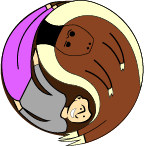the short of it:
The best action comes from non-action.

10. what may be done.
By husbanding the animal and spiritual souls, and embracing unity, it is possible to prevent their separation.1 By undivided attention to the passion-nature, and increasing tenderness, it is possible to be a little child.2 By putting away impurity from the hidden eye of the heart, it is possible to be without spot.3 By loving the people, and so governing the nation, it is possible to be unknown.4 In opening and shutting the heavenly doors (the mouth, the nostrils, etc.), it is possible to have no creaking.5 One may be bright and transparent on all sides, and yet be unknown.6
To produce and to nourish, to produce and have not, to act and expect not, to enlarge and cut not off, -this is called sublime virtue.
10. ‘possibilites.’
10.1 When the intelligent and animal souls are held together in one embrace, they can be kept from separating.1 When one gives undivided attention to the (vital) breath, and brings it to the utmost degree of pliancy, [they] can become as a (tender) babe.2 When [they have] cleansed away the most mysterious sights (of [their] imagination), [they] can become without a flaw.3
10.2 In loving the people and ruling the state, cannot [they] proceed without any (purpose of) action?4 In the opening and shutting of [their] gates* of heaven, cannot [they] do so as a female bird?5 While [their] intelligence reaches in every direction, cannot [they] (appear to) be without knowledge?6
10.3 (The Tao) produces (all things) and nourishes them; it produces them and does not claim them as its own; it does all, and yet does not boast of it; it presides over all, and yet does not control them. This is what is called ‘The mysterious Quality’ (of the Tao).
* The gates of heaven refers to the different senses of the person (sight, sound, taste, etc.) and the consequences of those senses. Successful navigation of the world doesn’t just involve feeding those senses, but also knowing how and when to close them off. Hence the flapping metaphor.
10. what can be done?
10.1 Who by unending discipline of the senses embraces unity cannot be disintegrated.1 By concentrating [their] vitality and inducing tenderness [they] can become like a little child.2 By purifying, by cleansing and profound intuition [they] can be free from faults.3
10.2 Who loves the people when administering the country will practise non-assertion.4
Opening and closing the gates* of heaven, [they] will be like a mother-bird;5 bright, and white, and penetrating the four quarters, [they] will be unsophisticated.6 [They quicken] them and [feed] them. [They quicken] but [own] not. [They act] but [claim] not. [They excel] but [rule] not. This is called profound virtue.
* The gates of heaven refers to the different senses of the person (sight, sound, taste, etc.) and the consequences of those senses. Successful navigation of the world doesn’t just involve feeding those senses, but also knowing how and when to close them off. Hence the flapping metaphor.

the long of it:
Chapter 10 of the Tao Te Ching is one of the more enigmatic chapters. Lao Tsu pairs a lot of metaphors back to back, inviting a lot of variety among translators. Legge even went so far as to suggest corruption among some of the Chinese characters (Legge 54).
However, Lao Tsu gives us more than enough clues to craft a very useful how-to-tao chapter, despite any textual slipperiness.
Skillful navigation of the world lies in knowing when to act, and knowing when to not-act (the natural state). To illustrate this, Lao Tsu re-introduces the female as metaphor.
In the Tao Te Ching the female represents the Great Mystery, the gateway to all understanding, the yin energy, or non-action (see Chap 6). Here it also represents a mother-bird flapping its wings. The action of flapping is relational to the non-action of gliding.
Each example Lao Tsu gives us is notated in the above translations:
Primal urges are the flap, developed urges the glide1; anger is the flap, tenderness the glide2; soiling is the flap, cleaning the glide3; ruling is the flap, loving the glide4; shutting is the flap, opening the glide5; knowledge is the flap, ignorance the glide6.
From the moment we are born, life demands we take constant action. But it’s often a challenge not flapping ourselves to death. We should take an example from the mother-bird, saving energy by gliding, going far and wide through non-action.
-TB
